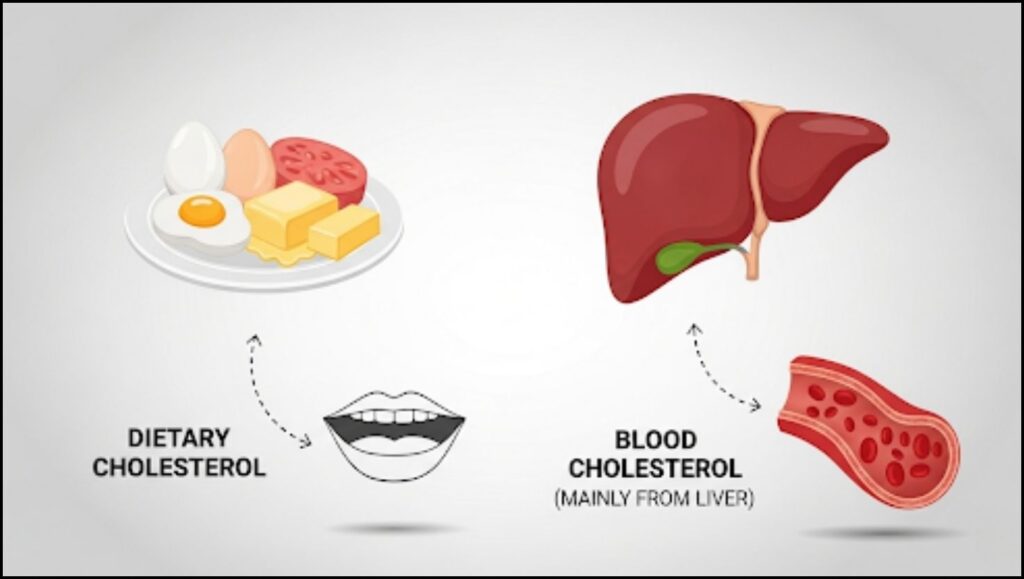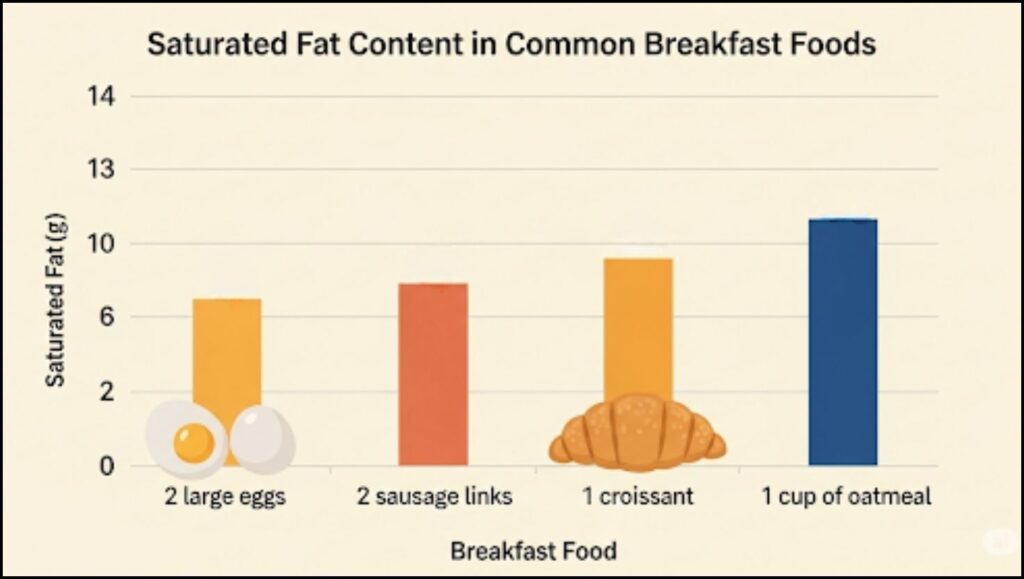For decades, the humble egg was a source of dietary debate, often blacklisted by those seeking to protect their heart health. However, a growing body of scientific evidence has shifted the focus, indicating that for most people, the dietary cholesterol found in foods like eggs has a minimal impact on blood cholesterol levels. Instead, health experts now point to a different factor as the primary dietary driver of unhealthy cholesterol: saturated fat.
Key Takeaways: Cholesterol & Diet
| Key Point | Finding | Source |
| Dietary vs. Blood Cholesterol | The cholesterol you eat (dietary) has a much smaller effect on the cholesterol in your blood than previously thought. | The liver produces about 80% of the body’s cholesterol. High intake of saturated and trans fats prompts the liver to produce more LDL (“bad”) cholesterol. |
| The Main Culprit | Saturated and trans fats are the main dietary drivers of high LDL (bad) blood cholesterol. | These fats are found in red meat, processed meats, full-fat dairy, and commercially baked and fried foods. |
| Current Egg Recommendation | Up to one whole egg per day is part of a heart-healthy diet for most healthy individuals. | This is consistent with guidelines from major health organizations, which emphasize overall dietary patterns over single foods. |
The Shifting Science on Dietary Cholesterol
The initial concern over eggs stemmed from a straightforward, yet now understood to be overly simplistic, assumption: eating cholesterol would directly raise the cholesterol in your blood. A large egg contains about 185 milligrams of cholesterol, a significant portion of the 300 mg daily limit once recommended by health authorities.
However, extensive research has clarified that the human body’s cholesterol regulation is more complex. The liver is the body’s main cholesterol producer. When you consume more cholesterol from food, your liver typically compensates by producing less of it.
“The body has a feedback mechanism for cholesterol that is quite effective for most of the population,” said Dr. Walter C. Willett, a professor of epidemiology and nutrition at the Harvard T.H. Chan School of Public Health, in a university publication. He explained that this system means dietary cholesterol itself is not the primary determinant of blood cholesterol levels, which are a key indicator of heart disease risk.
A landmark 2020 meta-analysis published in the BMJ, which reviewed data from over 1.7 million participants, found that consuming one egg per day was not associated with an increased risk of cardiovascular disease. This and other large-scale studies have prompted a major shift in nutritional guidance.

The Real Driver: Saturated and Trans Fats
If eggs aren’t the problem, what is? The scientific consensus now squarely points to saturated and, to an even greater extent, trans fats. Unlike dietary cholesterol, these fats directly influence how much LDL (low-density lipoprotein) cholesterol—often called “bad” cholesterol—your liver produces and releases into the bloodstream. High levels of LDL cholesterol can lead to atherosclerosis, a buildup of plaque in the arteries that increases heart disease risk.
Foods high in saturated fat include:
- Red meat (beef, lamb, pork)
- Processed meats (sausages, bacon, hot dogs)
- Full-fat dairy products (butter, cheese, cream)
- Coconut and palm oils
“The conversation needs to shift from vilifying a single food like eggs to understanding the overall dietary pattern,” states Dr. JoAnn Manson, chief of the Division of Preventive Medicine at Brigham and Women’s Hospital. “It’s the company the eggs keep. An omelet with vegetables and whole-wheat toast is a very different meal from eggs served with bacon, sausage, and buttered white toast.” This context is crucial. Studies have shown that people who eat more eggs often have other lifestyle habits, such as eating more processed meats and being less physically active, that confound the results and contribute to heart disease.

Updated Recommendations for a Heart-Healthy Diet
Reflecting this updated science, major health organizations have revised their guidelines. The U.S. Dietary Guidelines for Americans (2020-2025) removed the specific daily limit on dietary cholesterol and instead recommend limiting the intake of saturated fat to less than 10% of total daily calories. The American Heart Association (AHA) echoes this advice, emphasizing a diet rich in fruits, vegetables, whole grains, lean proteins, and healthy fats.
For the general healthy population, this means that including eggs in the diet is acceptable. “For most people, an egg a day does not increase their risk of a heart attack, a stroke, or any other type of cardiovascular disease,” says Dr. Frank Hu, chair of the Department of Nutrition at Harvard.
However, the advice may differ for certain individuals. Some research suggests that people with pre-existing conditions like type 2 diabetes or established heart disease may be more sensitive to dietary cholesterol. These individuals should consult with their healthcare provider to determine what is best for their specific health needs. The ultimate takeaway from decades of research is that a single nutrient or food is rarely the sole cause of chronic disease. For long-term heart health, the focus should be on building a balanced and sustainable dietary pattern that minimizes processed foods, trans fats, and excess saturated fat, while maximizing nutrient-dense, whole foods.
The ongoing research into diet and heart disease underscores a fundamental principle of nutrition science: understanding continues to evolve. While eggs have been largely vindicated, the emphasis on the foods they are often paired with provides a clearer roadmap for consumers aiming to reduce their heart disease risk and manage their blood cholesterol levels effectively.
USDA Issues Nationwide Health Alert for Frozen Pasta Over Undeclared, Life-Threatening Allergen


 Trump Claims Coca-Cola Will Adopt Cane Sugar; Company Denies Plan, Experts Debate Health Merits
Trump Claims Coca-Cola Will Adopt Cane Sugar; Company Denies Plan, Experts Debate Health Merits New Research Connects Ultra-Processed Foods to Higher Lung Cancer Risk, Even in Non-Smokers
New Research Connects Ultra-Processed Foods to Higher Lung Cancer Risk, Even in Non-Smokers Drinking Sugar May Pose Greater Health Risks Than Eating It, New Research Suggests
Drinking Sugar May Pose Greater Health Risks Than Eating It, New Research Suggests From Lab to Bedside: Overcoming the Hurdles to Patient Enrollment in Oncology Research
From Lab to Bedside: Overcoming the Hurdles to Patient Enrollment in Oncology Research